Reminiscing

 My grandnephew, Lucas Iverson has had to fight for every success in his life, because he is a child with Down’s Syndrome. Nevertheless, Lucas is a fighter, and he looks at each new obstacle as a challenge to be met and conquered. Lucas is an adventurer. He can find adventure anywhere. He is always on an adventure doing something in the house or outside. From Dino toys, to snakes, or to his favorite thing lately, which is playing with plastic hangers, Lucas is a busy boy.
My grandnephew, Lucas Iverson has had to fight for every success in his life, because he is a child with Down’s Syndrome. Nevertheless, Lucas is a fighter, and he looks at each new obstacle as a challenge to be met and conquered. Lucas is an adventurer. He can find adventure anywhere. He is always on an adventure doing something in the house or outside. From Dino toys, to snakes, or to his favorite thing lately, which is playing with plastic hangers, Lucas is a busy boy.
Lucas has struggled with a number of health issues, and it hasn’t always been easy to manage then and keep his allergies and sensitivities under control. The family is on a dairy free diet now for his ears, because dairy causes inflammation. He has had some issues with digestion, and for a time, he had a 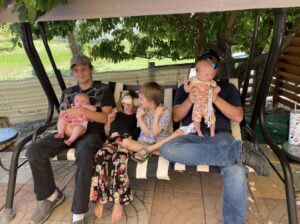 Gastrostomy Tube (G Tube), but with diet changes and the help of a number of specialists, Lucas in finally free of the G Tube. He is also getting taller and bigger, looking like a little man. These are all signs of a healthy turnaround, and for that we are eternally grateful to God. Much prayer has been sent up, and now comes answered prayer.
Gastrostomy Tube (G Tube), but with diet changes and the help of a number of specialists, Lucas in finally free of the G Tube. He is also getting taller and bigger, looking like a little man. These are all signs of a healthy turnaround, and for that we are eternally grateful to God. Much prayer has been sent up, and now comes answered prayer.
Lucas is doing well in school in his new town. Moving from one town to another isn’t easy, especially for kids in school. For Lucas, it could be harder still, but this change seems to have been a good one. He is learning about reading and much more. Lucas seems to be thriving in his new home, and he is always 
 learning. It’s in his nature.
learning. It’s in his nature.
This year has certainly been a year of change for Lucas, and for his family too. Six months ago, Lucas became a big brother again, and his sister, Zoey became a big sister for the first time. Their sister Alicen has been a wonderful blessing to the whole family, but Lucas is especially proud to be her big brother. When his sister, Zoey was born, Lucas was in no position to perform any big brother duties, and in fact, Zoey taught him many things. It was the lessons of his little sister, Zoey that will now allow Lucas to be a great big brother to his new little sister, Alicen, and he is very excited to get started. Today is Lucas’ 12th birthday. Happy birthday Lucas!! Have a great day!! We love you!!

 My niece, Chelsea Hadlock is a giver, through and through. She loves to donate things the family no longer uses to the rescue mission. She has a heart for kids and single moms, and much of her giving has focused on those kinds of things. Chelsea is a kind and loving woman, who has always wanted a family of her own, and she is an excellent wife and mother. Her family is so blessed by her. She sews and sometimes makes jewelry. She reminds me of the story in the Bible of the virtuous woman in Proverbs 31:10-31, in which the wife makes so many wonderful things for her family, so that her family can excel. It is one of my favorite stories in the Bible,
My niece, Chelsea Hadlock is a giver, through and through. She loves to donate things the family no longer uses to the rescue mission. She has a heart for kids and single moms, and much of her giving has focused on those kinds of things. Chelsea is a kind and loving woman, who has always wanted a family of her own, and she is an excellent wife and mother. Her family is so blessed by her. She sews and sometimes makes jewelry. She reminds me of the story in the Bible of the virtuous woman in Proverbs 31:10-31, in which the wife makes so many wonderful things for her family, so that her family can excel. It is one of my favorite stories in the Bible, 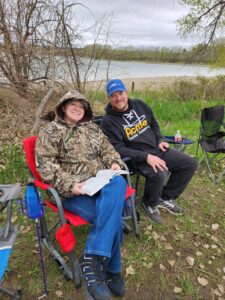
 and truly one that people should strive to be. She loves being in a large extended family too, and she is a great sister-in-law, as well as a great older sibling.
and truly one that people should strive to be. She loves being in a large extended family too, and she is a great sister-in-law, as well as a great older sibling.
As for Chelsea, the Bible has been a source of strength for her too. She has been focusing on Bible study habits over the past few years. She has been attending adult Sunday School and church services every possible Sunday. She is spending a lot of time doing her Bible studies and talking good notes for future use. She has grown so much in the 17+ years we have known her. She has such a sweet spirit, and is a great blessing to her whole family, and to anyone who has had the pleasure of knowing her.
Chelsea loves the outdoors and camping. She is a fulltime mom to 14-year-old Ethan and almost 12-year-old Aurora. She works hard to find fun opportunities for her children and her whole family out of town. They love to go camping and have already been camping at Guernsey Reservoir and in the Big Horn Mountains this year. She 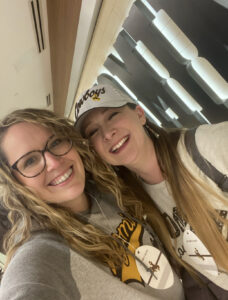
 loves bike riding and that is another fun outdoor activity that the whole family can enjoy.
loves bike riding and that is another fun outdoor activity that the whole family can enjoy.
As to extended family, Chelsea and her mom do lots of fun thing whenever she comes to town, like craft fairs and Comic Con events. Her in-laws, Allyn and Chris Hadlock and the rest of the family try to get together for Sunday dinner each week. Chelsea always contributes to the fun and relaxation. And…no small thing…Chelsea is a really good cook, so the family always gets the benefit of that!! Chelsea loves doing things for the family and for so many other people too. She is a giver through and through!! Today is Chelsea’s birthday. Happy birthday Chelsea!! Have a great day!! We love you!!
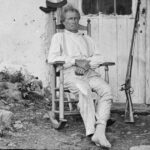
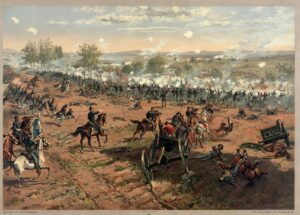 When things were heating up between the Confederate and Union soldiers around the town of Gettysburg on July 1, 1863, most of the town’s 2,400 civilian residents did their best to make themselves scarce. They didn’t want to find themselves pulled into the conflict on the basis of simply being in the vicinity when the Union needed reinforcements, so they did what they could to get out of the way…either staying shut up in their houses and basements or leaving for someplace calmer.
When things were heating up between the Confederate and Union soldiers around the town of Gettysburg on July 1, 1863, most of the town’s 2,400 civilian residents did their best to make themselves scarce. They didn’t want to find themselves pulled into the conflict on the basis of simply being in the vicinity when the Union needed reinforcements, so they did what they could to get out of the way…either staying shut up in their houses and basements or leaving for someplace calmer.
Not everyone felt that way, however. John Burns, who was about 69 years old at the time, although some said he was older, had fought a half-century earlier in the War of 1812. So, he was no stranger to war, but he took offence with the way a bunch of Rebels had come in and taken over his hometown. When he heard the sounds of battle on July 1, he told his wife he wanted to see what was going on. Grabbing his old flintlock musket, Burns left the house. He came across several Union officers and offered his services. The Union soldiers were basically amused by this strange character with his old musket, just showing up to offer to fight with them…and he wasn’t a young man, so that made it all the more strange. Still, Burns would not go away, and when he found a wounded soldier who would no longer need his rifle, Burns picked it up, and as the fighting heated up, Burns calmly took position behind a tree and began firing at the advancing Confederates. I guess the Union soldiers figured out pretty quickly that he meant business…especially when he was wounded three times in the intense fighting that day, and he still wouldn’t quit. One soldier recalled, “It must have been about noon when I saw a little old man coming up in the rear… I remember he wore a swallow-tailed coat with smooth brass buttons. He had a rifle on his shoulder. We boys began to poke fun at him as soon as he came amongst us, as we thought no civilian in his senses would [put] himself in such a place…”
The soldier then went on to say, “[When asked what] possessed him to come out there at such a time, he replied that ‘the rebels had either driven away or milked his cows, and that he was going to be even with them.’ About this time the enemy began to advance. Bullets were flying thicker and faster, and we hugged the ground about as close as we could. Burns got behind a tree and surprised us all by not taking a double-quick to the rear. He was as calm and collected as any veteran on the ground…I never saw John Burns after our movement to the right, when we left him behind his tree, and only know that he was true blue and grit to the backbone and fought until he was three times wounded.”
I’m sure it really upset the soldiers when they were forced to leave the injured Burns behind as they were ordered to retreat through the town. Burns was then found by the Confederates. Of course, since he had no uniform, they didn’t know that he wasn’t just a civilian who had been caught in the crossfire. Had they known he was fighting against them, they might have executed him, but a wise Burns had gotten rid of his weapon and pretended to be that helpless, unfortunate civilian who had been passing by at the wrong time. So, the Confederate surgeons treated him, and he was allowed to return home. The Confederates were none the wiser, and Burn had exacted his revenge. Burns was a happy man, because it just doesn’t get any better than that!!
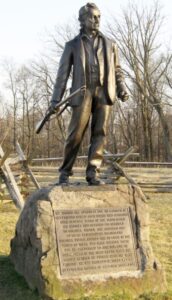
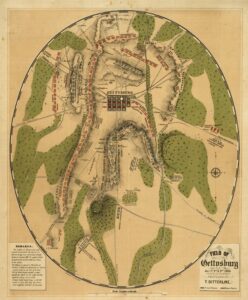 So impressed were the Union soldiers with John Burns, that his story was told to their superiors, and Burns is now memorialized with a statue on the Gettysburg battlefield, and his valor was called out in an after-action report by Major General Abner Doubleday. The memorial reads: “My thanks are specially due to a citizen of Gettysburg named John Burns who although over 70 years of age shouldered his musket and offered his services to Colonel Wister, One Hundred and Fiftieth Pennsylvania Volunteers. Colonel Wister advised him to fight in the woods as there was more shelter there but he preferred to join our line of skirmishers in the open fields. When the troops retired he fought with the Iron Brigade. He was wounded in three places.” John Burns truly was a civilian hero, but the real moral of the story is “Don’t mess with the cows.”
So impressed were the Union soldiers with John Burns, that his story was told to their superiors, and Burns is now memorialized with a statue on the Gettysburg battlefield, and his valor was called out in an after-action report by Major General Abner Doubleday. The memorial reads: “My thanks are specially due to a citizen of Gettysburg named John Burns who although over 70 years of age shouldered his musket and offered his services to Colonel Wister, One Hundred and Fiftieth Pennsylvania Volunteers. Colonel Wister advised him to fight in the woods as there was more shelter there but he preferred to join our line of skirmishers in the open fields. When the troops retired he fought with the Iron Brigade. He was wounded in three places.” John Burns truly was a civilian hero, but the real moral of the story is “Don’t mess with the cows.”

 For a number of years now, my daughter, Corrie Petersen has been on a wild ride!! Nursing school can’t be described any other way. It is difficult for everyone who embarks on this journey, but Corrie faced a number of other obstacles along the way. Set aside classes and clinicals for just a minute. Like most people in school these past few years there was the Covid-19 angle, and all that it entailed, including being sick. Secondly, Corrie and her husband, Kevin Petersen faced three loses in his family…his stepdad, Dwaine Skelton; his aunt, Nancy Jackson; and his uncle, Rex Jackson. That was followed by two weddings, her son Christopher and wife Karen Petersen on July 23, 2022; followed by her son, Josh and his wife, Athena Petersen who actually married right after Corrie passed her NCLEX test, on June 24, 2023. Also, during that time, Corrie and Kevin became grandparents to Cambree, Caysen, and Justin Petersen, with two more babies, Axel and Cyler Petersen on the way. In addition, to that Justin spent about ten days in the hospital right before last Christmas, with the flu. Oh, and did I mention that Corrie worked full time as a CNA throughout all of this!! Now, let’s get back to that studying. I don’t know about you, but I don’t know where she found the time to fit it all in. I do know, however, that she was one exhausted girl, and all I could do for her was pray over her!!
For a number of years now, my daughter, Corrie Petersen has been on a wild ride!! Nursing school can’t be described any other way. It is difficult for everyone who embarks on this journey, but Corrie faced a number of other obstacles along the way. Set aside classes and clinicals for just a minute. Like most people in school these past few years there was the Covid-19 angle, and all that it entailed, including being sick. Secondly, Corrie and her husband, Kevin Petersen faced three loses in his family…his stepdad, Dwaine Skelton; his aunt, Nancy Jackson; and his uncle, Rex Jackson. That was followed by two weddings, her son Christopher and wife Karen Petersen on July 23, 2022; followed by her son, Josh and his wife, Athena Petersen who actually married right after Corrie passed her NCLEX test, on June 24, 2023. Also, during that time, Corrie and Kevin became grandparents to Cambree, Caysen, and Justin Petersen, with two more babies, Axel and Cyler Petersen on the way. In addition, to that Justin spent about ten days in the hospital right before last Christmas, with the flu. Oh, and did I mention that Corrie worked full time as a CNA throughout all of this!! Now, let’s get back to that studying. I don’t know about you, but I don’t know where she found the time to fit it all in. I do know, however, that she was one exhausted girl, and all I could do for her was pray over her!!
Nevertheless, all of that journey (with the exception of the two babies on the way) is behind her now. On May 11, 2023, Corrie graduated Suma Cum Laude from nursing school (and as a member of Sigma Theta Tau International Honor Society of Nursing) in Las Vegas, Nevada, and it was an amazing time. Her husband, Kevin; my husband, Bob Schulenberg; and I couldn’t have been more proud. Kevin got to go on stage to place her pin for the pinning ceremony, and then she walked across that stage to receive her Batchelor of Science in Nursing 
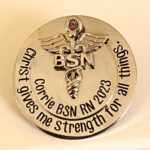
 (BSN)!! Going back to work as a CNA, while waiting to take her NCLEX had to be one of the hardest things she had ever done. She scheduled the test for June 14, 2023, and then came the question, “Will I pass??” It doesn’t matter how well you did in school, the NCLEX is not guaranteed. It’s a hard test, designed to tell them if you are a new nurse with the ability to be trained in the practical side of nursing. If a degreed nurse tells you they aren’t nervous or even in a panic, they are either a genius or lying. That test is brutal…or at least the days leading up to it are. Nevertheless, on June 16th, Corrie passed her NCLEX on the first try, and on June 20, she started her new job at Elkhorn Valley Rehabilitation Hospital. Her outlook on life did a full “about face!!” Her life went from a lot of hard work, tears, fatigue, and full-blown exhaustion, to “Oh my gosh!! I’m a nurse, and I absolutely love my job and the people I work with!!” What a great day that was, and what a great career change this has been for her!! Happy doesn’t begin to describe how I feel for my daughter!!
(BSN)!! Going back to work as a CNA, while waiting to take her NCLEX had to be one of the hardest things she had ever done. She scheduled the test for June 14, 2023, and then came the question, “Will I pass??” It doesn’t matter how well you did in school, the NCLEX is not guaranteed. It’s a hard test, designed to tell them if you are a new nurse with the ability to be trained in the practical side of nursing. If a degreed nurse tells you they aren’t nervous or even in a panic, they are either a genius or lying. That test is brutal…or at least the days leading up to it are. Nevertheless, on June 16th, Corrie passed her NCLEX on the first try, and on June 20, she started her new job at Elkhorn Valley Rehabilitation Hospital. Her outlook on life did a full “about face!!” Her life went from a lot of hard work, tears, fatigue, and full-blown exhaustion, to “Oh my gosh!! I’m a nurse, and I absolutely love my job and the people I work with!!” What a great day that was, and what a great career change this has been for her!! Happy doesn’t begin to describe how I feel for my daughter!!
Today, Corrie will work her 5th shift as a nurse. I’m sure that in the grand scheme of things, that these days when Corrie was just starting her new career, just embarking on her future…would seem like a drop in the bucket compared to the years ahead in which she will become a seasoned nurse and take care of countless numbers of patients, but I know that to Corrie, these days will always be among the sweetest of memories. These early nursing days will always be the ones that prove she could do it…that all her hard work, sleepless nights, exhausted days, and even time away from her family (as hard as that was) had paid off. Corrie’s career 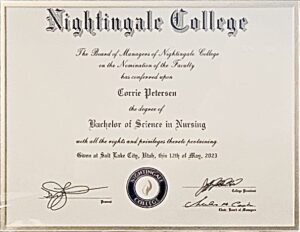
 really began as a caregiver in 2005, helping to take care of her ailing grandparents, Allen and Collene Spencer, as well as Walt and Joann Schulenberg. Truly they had to be mentioned, because it was in their care that the seeds of nursing were sown in Corrie, and I know that they would be, and in reality, they are very proud of their granddaughter…as are we. Today is Corrie’s first birthday as a nurse!! Happy birthday Corrie!! Have a great day!! We love you!!
really began as a caregiver in 2005, helping to take care of her ailing grandparents, Allen and Collene Spencer, as well as Walt and Joann Schulenberg. Truly they had to be mentioned, because it was in their care that the seeds of nursing were sown in Corrie, and I know that they would be, and in reality, they are very proud of their granddaughter…as are we. Today is Corrie’s first birthday as a nurse!! Happy birthday Corrie!! Have a great day!! We love you!!
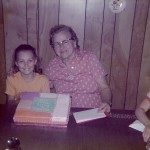
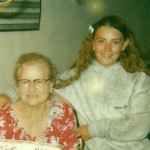 When my oldest daughter, Corrie Petersen was born, it was one of the happiest days of her great grandmother, Nettie Knox’s life, because her first great grandchild had been born on her birthday. It’s called “birthday twins” and it’s been the coolest thing for both Grandma Knox and Corrie. When Corrie was little, and indeed until grandma passed away when she was just a month past 82, and Corrie was just a month past 15, they celebrated their birthdays together. It was so important to both of them. Their bond was a very special one and lasted for the rest of Grandma’s life…and beyond. I know that with Grandma in Heaven now, Corrie feels sad sometimes, and her birthday is just a little bittersweet, but I hope Corrie knows just how proud Grandma always was of her.
When my oldest daughter, Corrie Petersen was born, it was one of the happiest days of her great grandmother, Nettie Knox’s life, because her first great grandchild had been born on her birthday. It’s called “birthday twins” and it’s been the coolest thing for both Grandma Knox and Corrie. When Corrie was little, and indeed until grandma passed away when she was just a month past 82, and Corrie was just a month past 15, they celebrated their birthdays together. It was so important to both of them. Their bond was a very special one and lasted for the rest of Grandma’s life…and beyond. I know that with Grandma in Heaven now, Corrie feels sad sometimes, and her birthday is just a little bittersweet, but I hope Corrie knows just how proud Grandma always was of her.
These past few years…the craziest ones Corrie has ever spent, have brought her to a new career, and I have been thinking about just how proud Grandma would have been of her birthday twin. She was always proud of Corrie, and it didn’t matter what kind of work she did, but the hard work to get where she is now…that’s what Grandma would have been proud of. Grandma was a hard-working woman in her younger years, but most of it was housework and raising her children. These days many women work outside the home. It is more unusual for someone to be a stay-at-home mom. The opportunities for Grandma were different than those available to Corrie. Then again, the things she did, that Corrie will never do, are many as well.
Grandma was born on June 30, 1908. Life was quite different then. The automobile was invented, but still very new, and it was not unusual to see horses and buggies on the same streets as the cars. These days, people are fighting for a minimum wage of $15.00 an hour, but back then, the average factory worker made around $12.00 a week!! Of course, the prices of things were much less then too, but it does show a markedly different 
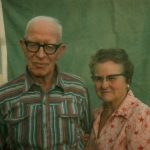 world when Grandma was born, than the one we live in now. When you think about it, if we cut the price of everything and then cut the wages, we would be in the same place we are right now. Grandma Knox saw a lot of changes during her time here on Earth, and I’m sure some things seemed as strange as the first laptop did to us. Progress is a big deal in any era. Still, for Grandma, little could top that fact that her first great grandchild had arrives on her birthday. She considered it the best gift ever. Today marks the 115th anniversary of Grandma Knox’s birth!! Happy birthday in Heaven, Grandma. We love and miss you very much.
world when Grandma was born, than the one we live in now. When you think about it, if we cut the price of everything and then cut the wages, we would be in the same place we are right now. Grandma Knox saw a lot of changes during her time here on Earth, and I’m sure some things seemed as strange as the first laptop did to us. Progress is a big deal in any era. Still, for Grandma, little could top that fact that her first great grandchild had arrives on her birthday. She considered it the best gift ever. Today marks the 115th anniversary of Grandma Knox’s birth!! Happy birthday in Heaven, Grandma. We love and miss you very much.
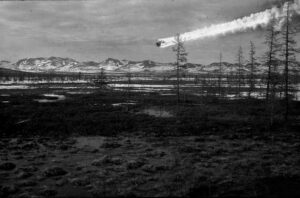 Most of us don’t really think much about the possibility of a meteor hitting the Earth, and the reality is that it’s pretty rare…at least one of much size. Most of them burn up as they enter our atmosphere, and most often the ones that do hit are so small that they do little damage. The Tunguska event a definite exception to that rule. Coming in from the east-southeast, and at and incredible speed of about 60,000 miles per hour, but amazingly still not actually impacting the Earth, it was still classified as an impact event, even though no impact crater has been found. Instead, the object is thought to have disintegrated at an altitude of 3 to 6 miles above the surface, rather than actually impacting the Earth. The meteor did not simply fall apart or burn up, but rather it blew up in what was estimated as a 12-megaton explosion, near the Podkamennaya Tunguska River in Yeniseysk Governorate, which is now Krasnoyarsk Krai, Russia, on the morning of June 30, 1908.
Most of us don’t really think much about the possibility of a meteor hitting the Earth, and the reality is that it’s pretty rare…at least one of much size. Most of them burn up as they enter our atmosphere, and most often the ones that do hit are so small that they do little damage. The Tunguska event a definite exception to that rule. Coming in from the east-southeast, and at and incredible speed of about 60,000 miles per hour, but amazingly still not actually impacting the Earth, it was still classified as an impact event, even though no impact crater has been found. Instead, the object is thought to have disintegrated at an altitude of 3 to 6 miles above the surface, rather than actually impacting the Earth. The meteor did not simply fall apart or burn up, but rather it blew up in what was estimated as a 12-megaton explosion, near the Podkamennaya Tunguska River in Yeniseysk Governorate, which is now Krasnoyarsk Krai, Russia, on the morning of June 30, 1908.
The explosion was over the sparsely populated Eastern Siberian Taiga, which likely saved many lives, but  flattened an estimated 80 million trees over an area of 830 square miles of forest. The people who did witness the explosion, from a great distance, of course, reported that at least three people may have died in the event. The explosion is generally attributed to a meteor air burst, which is the atmospheric explosion of a stony asteroid approximately 160–200 feet in size. The Tunguska event remains the largest impact event on Earth in recorded history, though it is assumed that much larger impacts have occurred in times before history was recorded. An 12-megaton explosion could destroy a large city. Of course, events like this and even smaller ones have caused scientists to attempt to figure out ways to avoid these “direct hits” in the future…a rather large job, since moving the Earth out of the way of asteroids is really not an option.
flattened an estimated 80 million trees over an area of 830 square miles of forest. The people who did witness the explosion, from a great distance, of course, reported that at least three people may have died in the event. The explosion is generally attributed to a meteor air burst, which is the atmospheric explosion of a stony asteroid approximately 160–200 feet in size. The Tunguska event remains the largest impact event on Earth in recorded history, though it is assumed that much larger impacts have occurred in times before history was recorded. An 12-megaton explosion could destroy a large city. Of course, events like this and even smaller ones have caused scientists to attempt to figure out ways to avoid these “direct hits” in the future…a rather large job, since moving the Earth out of the way of asteroids is really not an option.
The Tunguska Event was a mystery for some time, after locals reported hearing a shattering explosion. Upon  investigation, it was found that trees were charred and leveled, and also that seismic waves were felt traveling through Europe. There are still some questions concerning the event, but it is widely believed to have been a comet colliding with Earth’s atmosphere. It is estimated that the explosion occurred 15,000-30,000 feet above the surface of the Earth. That explains the fact that no impact crater was found, still one would expect an explosion of that magnitude to trigger a massive fire. It did not, causing scientists to speculate that the subsequent blast wave doused the flames. Still, the massive amount of energy expelled by the blast is estimated to have been stronger than the bomb dropped on Hiroshima.
investigation, it was found that trees were charred and leveled, and also that seismic waves were felt traveling through Europe. There are still some questions concerning the event, but it is widely believed to have been a comet colliding with Earth’s atmosphere. It is estimated that the explosion occurred 15,000-30,000 feet above the surface of the Earth. That explains the fact that no impact crater was found, still one would expect an explosion of that magnitude to trigger a massive fire. It did not, causing scientists to speculate that the subsequent blast wave doused the flames. Still, the massive amount of energy expelled by the blast is estimated to have been stronger than the bomb dropped on Hiroshima.
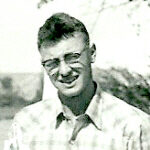
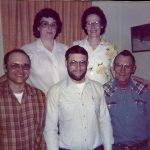 My husband’s uncle, Butch Hein is the youngest of his grandmother, Vina Hein’s five children. Grandma had two children, Marion Kanta and Walt Schulenberg (my husband’s dad) from her first marriage to Andrew Schulenberg; and three children, Esther Hein, Eddie Hein, and Bernard “Butch” Hein, from her second marriage to Walt Hein. Durning her second marriage, the family lived on the ranch that had been owned by Walt’s dad, Christian Hein. Because of that, ranching was practically a part of Butch’s DNA, It was as much a part of his as the air he breathed. While the older children really didn’t want to be ranchers, Butch really did, and since parents usually try to pass their lives’ work down to their kids, Walt had hoped that one of his kids would want to be a rancher. Butch fulfilled the desire his dad had. They worked the ranch together, and when Walt was ready, Butch took over in his dad’s retirement years.
My husband’s uncle, Butch Hein is the youngest of his grandmother, Vina Hein’s five children. Grandma had two children, Marion Kanta and Walt Schulenberg (my husband’s dad) from her first marriage to Andrew Schulenberg; and three children, Esther Hein, Eddie Hein, and Bernard “Butch” Hein, from her second marriage to Walt Hein. Durning her second marriage, the family lived on the ranch that had been owned by Walt’s dad, Christian Hein. Because of that, ranching was practically a part of Butch’s DNA, It was as much a part of his as the air he breathed. While the older children really didn’t want to be ranchers, Butch really did, and since parents usually try to pass their lives’ work down to their kids, Walt had hoped that one of his kids would want to be a rancher. Butch fulfilled the desire his dad had. They worked the ranch together, and when Walt was ready, Butch took over in his dad’s retirement years. 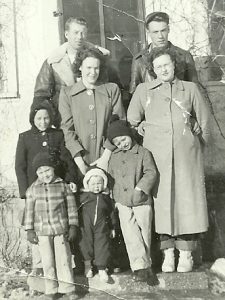
Butch was quite a bit younger than my father-in-law, Walt Schulenberg, so his nieces and nephews were not that much older than their uncle. Butch was just four years old when he first became an uncle, and by the time he was ten years old he had five nieces and one nephew, and more would follow in quick succession. By the time his siblings were done having children, Butch would have nineteen nieces and nephews. He would also have a son named Scott, and a daughter named Crista, who died in infancy. In reality, Butch didn’t really remember life without nieces and nephews. I’m sure that as a young uncle, or more correctly, a kid who was an uncle, having nieces and nephews gave Butch a lot of “friends” to play with, in addition to his older sister and brother.
There is lots to do on a ranch. In addition to the cattle, there are horses to ride and usually other animals to help out with. Life on a ranch usually includes other types of animals that can be used to food, as well as a garden, which I know Grandma had. What kid do you know that wouldn’t go and have a little “garden raid” when they wanted a snack. Beans and carrots make great fresh snacks, and I’m sure Butch and his 
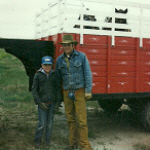 siblings took full advantage of that fact, although probably not to a large extent, because if you eat all the vegetables in the garden, your Mom and Dad would be sure to notice. Besides that, helping on a ranch keeps a kid pretty busy. Most of their “snacks” were in the form of big meals at mealtime. As hard as the work was, Butch thrived on it, and couldn’t wait to work on the ranch with his dad as an adult. Him taking over the ranch was inevitable, and Butch was very happy about that. Today is Butch’s birthday. Happy birthday Butch!! Have a great day!! We love you!!
siblings took full advantage of that fact, although probably not to a large extent, because if you eat all the vegetables in the garden, your Mom and Dad would be sure to notice. Besides that, helping on a ranch keeps a kid pretty busy. Most of their “snacks” were in the form of big meals at mealtime. As hard as the work was, Butch thrived on it, and couldn’t wait to work on the ranch with his dad as an adult. Him taking over the ranch was inevitable, and Butch was very happy about that. Today is Butch’s birthday. Happy birthday Butch!! Have a great day!! We love you!!

 My grandnephew, Chris Spicer just graduated from high school and then immediately moved with his mom, Andrea Beach, from Rawlins, Wyoming to Casper, Wyoming. Andrea has always wanted to live in Casper, and Chris wants that too, especially since he will be going to college at Casper College in the fall to study Graphic Design. It has been a very eventful year for Chris. He had been thinking about becoming a phlebotomist, but with everything going on in the world, he decided that he would switch gears, and go with Graphic Design.
My grandnephew, Chris Spicer just graduated from high school and then immediately moved with his mom, Andrea Beach, from Rawlins, Wyoming to Casper, Wyoming. Andrea has always wanted to live in Casper, and Chris wants that too, especially since he will be going to college at Casper College in the fall to study Graphic Design. It has been a very eventful year for Chris. He had been thinking about becoming a phlebotomist, but with everything going on in the world, he decided that he would switch gears, and go with Graphic Design.
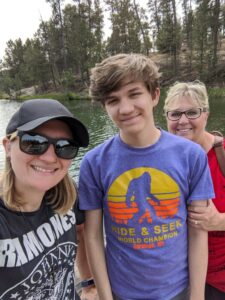
Chris is really happy to be living in Casper. His grandparents, Caryl and Mike Reed, live here too. Chris and his mom are living in the apartment on the Reed ranch for now, while they look for jobs and an apartment. First, however, comes their annual trip to the Black Hills, which is normally Chris, his mom, and his grandma, but this year is going to include his grandpa too. They left yesterday, and one of the highlights o this trip is the planned tour through one or more of the caves in the Black Hills. They haven’t done that before, so they are very excited. I have done them several times, so I can say that they will have a great time. They might even try Zip Lining!! For Chris, this is a prelude to the rest of his life. It’s a vacation they take every year, but this time will be different to a degree. It will be more like a graduation trip too, but it will be different in another way, because Chris and his mom will not be returning to Rawlins, and he will not be going back to high school in the fall. All of that is his past life, and he is starting a new life now.
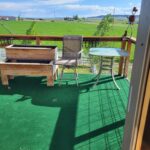
 Chris is a vibrant, happy person, with a great smile. He loves playing video games and at least in the past, has loved longboarding, although where his is living right now, he might not be able to use it. The apartment they are currently living in has beautiful views, but not much concrete. Nevertheless, once school starts, he may not have much time for games and longboarding. His time will most likely be taken up by books and computer work. I think it is going to be an exciting life for Chris, and I wish him all the best. Today is Chris’ 18th birthday. Happy birthday Chris!! Have a great day!! We love you!!
Chris is a vibrant, happy person, with a great smile. He loves playing video games and at least in the past, has loved longboarding, although where his is living right now, he might not be able to use it. The apartment they are currently living in has beautiful views, but not much concrete. Nevertheless, once school starts, he may not have much time for games and longboarding. His time will most likely be taken up by books and computer work. I think it is going to be an exciting life for Chris, and I wish him all the best. Today is Chris’ 18th birthday. Happy birthday Chris!! Have a great day!! We love you!!
 For most women, especially during the Revolutionary War era, life’s losses brought a long time of mourning, the wearing of black dresses, and times of reflection, before they eventually consider remarrying. For Anne Hennis Trotter Bailey, whose lifestyle earned her the name “Mad Anne” for her acts of bravery and heroism that were considered to be somewhat eccentric for a woman of her time, loss brought about quite the opposite reaction. Anne Hennis was born in Liverpool England in 1742. She was formally educated and learned to read and write. Her first experience with loss came before she turned 18. It is not known how they died, but both of Anne’s parents were gone before she turned 18, and she became an orphan. Life for Ann, who was poor and had a hard time earning enough money to survive, immediately became very hard. Anne had family near Staunton in the Shenandoah Valley, and when she was 19, she sailed to America to live with them. There, in 1765, she met and married Richard Trotter, a seasoned frontiersman and experienced soldier. The couple had one son named William.
For most women, especially during the Revolutionary War era, life’s losses brought a long time of mourning, the wearing of black dresses, and times of reflection, before they eventually consider remarrying. For Anne Hennis Trotter Bailey, whose lifestyle earned her the name “Mad Anne” for her acts of bravery and heroism that were considered to be somewhat eccentric for a woman of her time, loss brought about quite the opposite reaction. Anne Hennis was born in Liverpool England in 1742. She was formally educated and learned to read and write. Her first experience with loss came before she turned 18. It is not known how they died, but both of Anne’s parents were gone before she turned 18, and she became an orphan. Life for Ann, who was poor and had a hard time earning enough money to survive, immediately became very hard. Anne had family near Staunton in the Shenandoah Valley, and when she was 19, she sailed to America to live with them. There, in 1765, she met and married Richard Trotter, a seasoned frontiersman and experienced soldier. The couple had one son named William.
During the westward movement, when more and more people were heading west in search of land and adventure, fights began to break out between settlers and the Indians who had lived there for many years. The Governor of Virginia organized border militia to protect the settlers there. Richard Trotter joined this militia. On October 19, 1774, Shawnee Chief Cornstalk attacked the Virginia militia, hoping to halt their advance into the Ohio Country. This became known as the Battle of Point Pleasant. The battle raged on until Cornstalk finally retreated. The Virginians, along with a second force led by Lord Dunmore, the Royal Governor of Virginia, then marched into the Ohio Country. Cornstalk had no choice but to agree to a treaty, ending the war. Many men on both sides lost their lives in the battle, including Richard Trotter.
For Anne this could have meant years of sadness as a widow, but Anne would have none of that. Anne, upon learning of her husband’s death, and determined to seek revenge, left her young son in the care of neighbors, dressed in the clothing of a frontiersman, and set out to avenge her loss. A woman alone going out to kill the Indians seemed like an insane move to make, and most people probably thought she would be dead in a matter of days…but they didn’t know Anne. She became known as “Mad Anne” from that time forward….to whites and Indians alike. In the beginning, Anne rode from one recruiting station to another, asking them to volunteer their services to the militia in order to keep the women and children of the border safe, to fight for freedom from the Indians, and later the British.
People from Staunton, Virginia, to what is now Charleston, West Virginia, and Gallipolis, Ohio, knew Anne, mostly due to the unusual sight she presented. She usually wore buckskin leggings, petticoats, heavy brogan shoes, a man’s coat and hat, a hunting knife in a belt around her waist, and a rifle slung over her shoulder…everything she needed to be in the pioneer spirit in the late 1700s. Although Mad Anne mostly rode up and down the western frontier, she also recruited for the Continental Army, and delivered messages between various Army detachments during the Revolutionary War. It seemed that there was no job she wouldn’t take, including traveling as a courier on horseback between Forts Savannah and Randolph, a distance of almost 160 miles. Her fearless personality made her well known and respected by the settlers along the route. Mad Anne 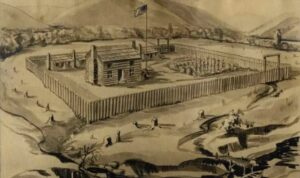 was even respected, or maybe feared is a better word, by the Shawnee Indians. On her rides Bailey often came across a particular group of Shawnee Indians. They often chased her, then on one such encounter, she had had enough. Just when she was about to be caught, she jumped off her horse and hid in a log. Strangely, the Shawnee looked everywhere for her and even stopped to rest on the log, but they could not find her. Finally, they gave up and stole her horse. She waited a while after they left, and then came out of the log. She waited until nightfall, then crept into their camp and retrieved her horse…a bold move, but nothing like the next move she made. Once she was far enough away, she started screaming and shrieking at the top of her lungs. Now waking up to that would be shocking enough, but this woman was acting totally crazy, and the Shawnee thought she was possessed and therefore could not be injured by a bullet or arrow. After that display, the Shawnee saw her often, but the kept far away from her, because they were totally afraid of her. With that assurance backing her, Mad Anne knew that she was relatively safe living in the woods.
was even respected, or maybe feared is a better word, by the Shawnee Indians. On her rides Bailey often came across a particular group of Shawnee Indians. They often chased her, then on one such encounter, she had had enough. Just when she was about to be caught, she jumped off her horse and hid in a log. Strangely, the Shawnee looked everywhere for her and even stopped to rest on the log, but they could not find her. Finally, they gave up and stole her horse. She waited a while after they left, and then came out of the log. She waited until nightfall, then crept into their camp and retrieved her horse…a bold move, but nothing like the next move she made. Once she was far enough away, she started screaming and shrieking at the top of her lungs. Now waking up to that would be shocking enough, but this woman was acting totally crazy, and the Shawnee thought she was possessed and therefore could not be injured by a bullet or arrow. After that display, the Shawnee saw her often, but the kept far away from her, because they were totally afraid of her. With that assurance backing her, Mad Anne knew that she was relatively safe living in the woods.
Anne met John Bailey, a member of a legendary group of frontier scouts called the Rangers, after several years living on her own. The Rangers were defending the Roanoke and Catawba settlements from Indian attacks. He was rather smitten with Mad Anne’s rough ways, and they were married November 3, 1785. In 1787, along the Kanawha River at the mouth of the Elk River, a blockhouse was built. The block house would later become Fort Lee in honor of Virginia’s Governor Henry Lee. Fort Lee was where John Bailey was assigned to duty, taking with him his now famous, gun-toting, hard-riding bride.
In 1788, John Bailey was transferred to Fort Clendenin, which was a more active area of conflict between the settlers and Native Americans. Anne Bailey began working for the settlers as well, riding on horseback to warn them of impending attacks. In 1791, she singlehandedly saved Fort Lee from certain destruction by hostile Indians with a three-day, 200–mile round trip to replenish their supply of gunpowder. She rode for hours, finally reaching Fort Savannah at Lewisburg, where the gunpowder was quickly packed aboard her horse and one additional mount, before she reversed her direction and galloped full speed back to Fort Lee.
After she returned, the siege was ended, the attackers were defeated. For her bravery Anne was given the horse that had carried her away and brought her safely back. The animal was said to have been a beautiful black, sporting white feet and a blazed face. She dubbed him Liverpool, in honor of her birthplace. Anne Bailey was forty-nine years old when she made this famous ride. Anne became a legend among the other settlers, and she was always welcome in their homes. John Bailey died in 1802, and Anne decided that she no longer wanted to live in a house, so she lived in the wilderness for over 20 years. She visited friends in town occasionally, but usually slept outside. Her favorite place was a cave near Thirteen Mile Creek.
A widow for the second time, and in her late fifties, Anne later went to live with her son, but her love for riding and of the wilderness had not ceased. For many years afterwards she could be seen riding from Point Pleasant to Lewisburg and Staunton, carrying mail and as an express messenger. Bailey continued working as a messenger, 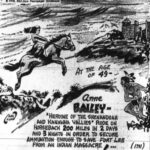 bringing supplies for the settlers throughout the area. She finally retired in 1817 after making one last trip to Charleston at age 75. In 1818 Anne moved with her son and his family to his new farm in Gallia County, Ohio. Instead of asking her to stay with his family, her son, who had apparently never felt any ill-will toward his mother who was often not around, built her a cabin nearby so she would still feel independent. Bailey continued working as a messenger, bringing supplies for the settlers throughout the area. Anne Hennis Trotter Bailey died at Gallipolis, Ohio, November 22, 1825, at the age of 83. She was buried in the Trotter Graveyard near her son’s home, and her remains rested there for seventy-six years. On October 10, 1901, her remains were re-interred in Monument Park in Point Pleasant, under the auspices of the Colonel Charles Lewis, Jr. Chapter of the D. A. R.
bringing supplies for the settlers throughout the area. She finally retired in 1817 after making one last trip to Charleston at age 75. In 1818 Anne moved with her son and his family to his new farm in Gallia County, Ohio. Instead of asking her to stay with his family, her son, who had apparently never felt any ill-will toward his mother who was often not around, built her a cabin nearby so she would still feel independent. Bailey continued working as a messenger, bringing supplies for the settlers throughout the area. Anne Hennis Trotter Bailey died at Gallipolis, Ohio, November 22, 1825, at the age of 83. She was buried in the Trotter Graveyard near her son’s home, and her remains rested there for seventy-six years. On October 10, 1901, her remains were re-interred in Monument Park in Point Pleasant, under the auspices of the Colonel Charles Lewis, Jr. Chapter of the D. A. R.
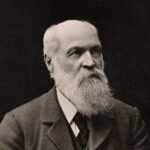
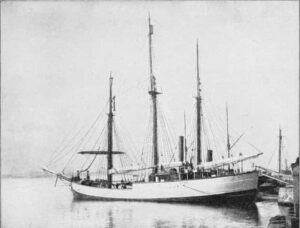 It’s strange to think that someone would build a ship for the sole purpose of freezing it in the Artic ice sheet as a way of “floating” it over the North Pole, but that was exactly the plan when a ship named Fram (meaning Forward) was designed and built by the Scottish-Norwegian shipwright Colin Archer. The ship was built for Fridtjof Nansen’s 1893 Arctic expedition, to actually freeze it in the polar ice. The ship was a special design to be used in expeditions of the Arctic and Antarctic regions by the Norwegian explorers Fridtjof Nansen, Otto Sverdrup, Oscar Wisting, and Roald Amundsen between 1893 and 1912. Nansen’s ambition was to explore the Arctic farther north than anyone else, but he knew that they would be dealing with a problem that many sailing on the polar ocean had encountered before him, a problem that ended their expeditions…the freezing ice could crush a ship and end the expedition. The ship that was going to survive freezing in the Artic ice sheet, would have to be different…in just about every way. Nansen’s idea was to build a ship that could survive the pressure of the ice, not because it was stronger, but because it’s very shape would let the ice push the ship up, so it would actually “float” on top of the ice.
It’s strange to think that someone would build a ship for the sole purpose of freezing it in the Artic ice sheet as a way of “floating” it over the North Pole, but that was exactly the plan when a ship named Fram (meaning Forward) was designed and built by the Scottish-Norwegian shipwright Colin Archer. The ship was built for Fridtjof Nansen’s 1893 Arctic expedition, to actually freeze it in the polar ice. The ship was a special design to be used in expeditions of the Arctic and Antarctic regions by the Norwegian explorers Fridtjof Nansen, Otto Sverdrup, Oscar Wisting, and Roald Amundsen between 1893 and 1912. Nansen’s ambition was to explore the Arctic farther north than anyone else, but he knew that they would be dealing with a problem that many sailing on the polar ocean had encountered before him, a problem that ended their expeditions…the freezing ice could crush a ship and end the expedition. The ship that was going to survive freezing in the Artic ice sheet, would have to be different…in just about every way. Nansen’s idea was to build a ship that could survive the pressure of the ice, not because it was stronger, but because it’s very shape would let the ice push the ship up, so it would actually “float” on top of the ice.
Fram is a three-masted schooner with a total length of 127 feet 11 inches and width of 36 feet 1 inch. The ship was designed to be both unusually wide and unusually shallow in order to better withstand the forces of pressing ice. By design it would be able to push up through the ice to the top of the ice sheet, thereby allowing 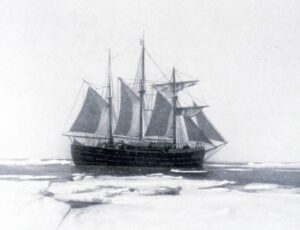 it to float. Fram’s outer layer was made of, which can withstand the ice. It also had almost no keel so it could handle the shallow waters Nansen expected to encounter. The ship was designed with a retractable rudder and propeller, and it was carefully insulated to allow the crew to live on board for up to five years. A windmill was installed to run a generator that would provide electric power for lighting by electric arc lamps. The ship was launched on 26 October 1892. During the initial building process, Fram was fitted with a steam engine, which was fine, until something better came along. Then, before Amundsen’s expedition to the South Pole in 1910, the engine was replaced with a diesel engine, a first for polar exploration vessels.
it to float. Fram’s outer layer was made of, which can withstand the ice. It also had almost no keel so it could handle the shallow waters Nansen expected to encounter. The ship was designed with a retractable rudder and propeller, and it was carefully insulated to allow the crew to live on board for up to five years. A windmill was installed to run a generator that would provide electric power for lighting by electric arc lamps. The ship was launched on 26 October 1892. During the initial building process, Fram was fitted with a steam engine, which was fine, until something better came along. Then, before Amundsen’s expedition to the South Pole in 1910, the engine was replaced with a diesel engine, a first for polar exploration vessels.
Because of wreckage found at Greenland from USS Jeannette, which was lost off Siberia, and driftwood found in the regions of Svalbard and Greenland, Nansen had a theory that an ocean current flowed beneath the Arctic ice sheet from east to west, bringing driftwood from the Siberian region to Svalbard and further west. That was the main reason for building Fram. He wanted to order to explore this theory. His expedition ended up lasting three years, during which time, Nansen realized that Fram would not reach the North Pole directly. The current either wasn’t strong enough, or the polar ice was actually on land at the North Pole. So, he and Hjalmar Johansen set out to reach it on skis. After reaching 86° 14′ north, he had to turn back to spend the winter at Franz Joseph Land. During their expedition, Nansen and Johansen survived on walrus and polar bear meat and blubber. Finally, after they met up with British explorers from the Jackson-Harmsworth Expedition, they arrived back in Norway only days before the Fram also returned there. Their skiing mission was far more successful than the Fram’s mission, as the ship had spent nearly three years trapped in the ice, after only reaching 85° 57′ N. Fram made a scientific expedition to the Canadian Artic Archipelago between 1892 and 1902, and after being fitted with the diesel engine, Amundsen made his South Pole expedition from 1910 to 1912. Fram was 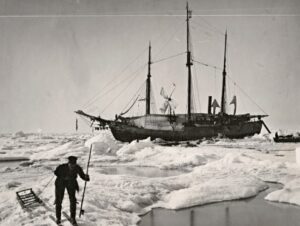
 the first ship to reach the South Pole, during which Fram reached 78° 41′ S.
the first ship to reach the South Pole, during which Fram reached 78° 41′ S.
Following these expeditions, Fram was left to decay in storage from 1912 until the late 1920s. Then, Lars Christensen, Otto Sverdrup, and Oscar Wisting decide to begin an effort to preserve it by starting the Fram Committee. Finally, the now restored ship was installed in the Fram Museum in 1945, where it now stands.

